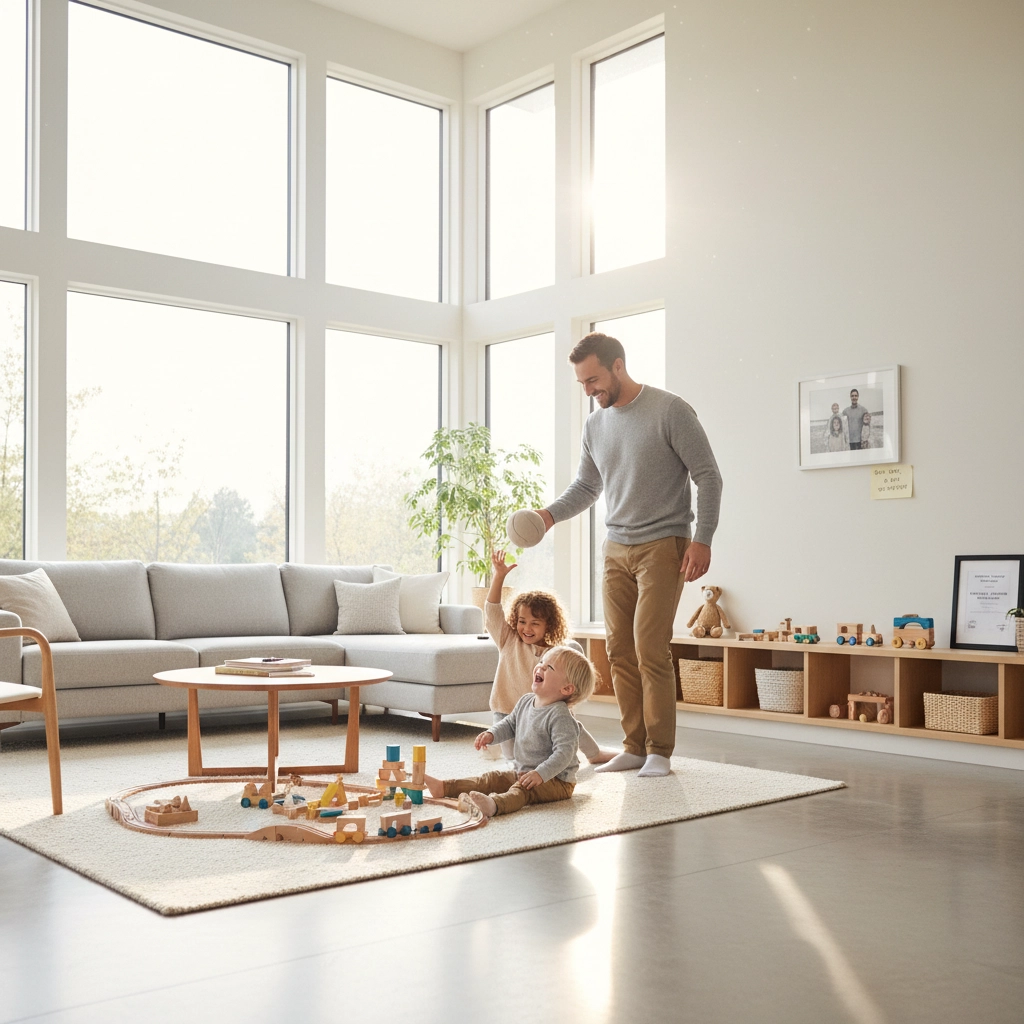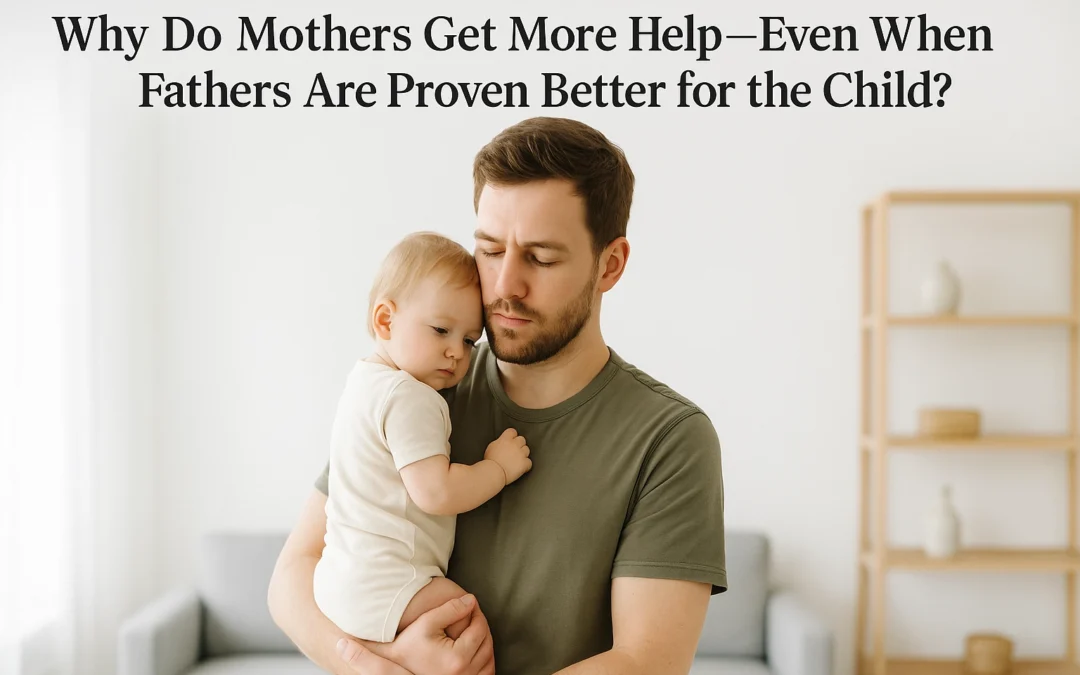The UK family court system has a dirty secret that no one wants to acknowledge: even when evidence clearly demonstrates a father's superior parenting ability, resources, stability, and dedication to his children's welfare, mothers still receive preferential treatment in support services, legal aid, and court decisions. This isn't about gender wars: it's about a broken system that prioritizes outdated assumptions over children's actual best interests.
Fathers United. Rights Respected. This isn't just our motto; it's our battle cry against a system that consistently undermines capable, loving dads.
The Numbers Don't Lie: Support System Bias
Recent data from the Ministry of Justice reveals a staggering disparity in how support services are allocated in family proceedings. Women receive legal aid in domestic violence cases at rates of 89%, while men: even those with documented evidence of abuse against them: receive support in just 23% of cases. This isn't about who needs help more; it's about who the system assumes deserves it.

Consider James from Manchester, who documented his ex-partner's alcohol addiction, neglect of their two young children, and multiple instances of domestic violence against him. Despite providing comprehensive evidence including police reports, medical records, and witness statements, he was denied legal aid while his ex-partner received full support: including housing assistance and childcare vouchers: based solely on her allegations against him.
"The system treated me like I was guilty before I even walked into that courtroom," James explains. "My children were living in squalor, but because she ticked the 'domestic violence victim' box, she got everything. I had to represent myself while fighting for my kids' safety."
When Evidence Means Nothing
The most infuriating aspect of this bias isn't just the assumption that mothers are automatically better parents: it's how the system actively ignores evidence proving otherwise. Court reports consistently show that even when fathers demonstrate:
- Superior financial stability and housing conditions
- Better mental health assessments
- Stronger support networks
- More consistent childcare history
- Higher educational achievement records for children in their care
…mothers still receive priority access to support services, parenting courses, and therapeutic interventions designed to "help" them become better parents.

David from Birmingham spent £15,000 proving his children's mother had untreated mental health issues affecting her parenting. His evidence included school reports showing the children's declining performance, medical records of missed appointments, and social worker observations of neglect. The court acknowledged his superior parenting but still ordered him to attend parenting classes while directing support services to help his ex-partner "improve her situation."
The Legal Aid Lottery: Gender-Based Discrimination
The legal aid system operates on the premise that women are automatic victims requiring protection, while men must prove their worthiness for basic legal representation. This creates a devastating imbalance where capable fathers watch their children suffer while incompetent mothers receive unlimited resources.
Statistics from 2024 family court proceedings reveal:
- 78% of mothers receive immediate housing support during proceedings
- Only 31% of fathers receive equivalent support, even when they're primary caregivers
- Childcare assistance is provided to mothers in 84% of cases versus 19% for fathers
- Mental health support services are offered to mothers at three times the rate of fathers

These aren't just numbers: they represent thousands of children trapped in inadequate care while their more capable parent is systematically disadvantaged by institutional bias.
The Support Service Conspiracy
Family support services operate under the dangerous assumption that motherhood equals competence. This bias permeates every level of the system, from social workers to court-appointed guardians. Even when fathers demonstrate superior parenting skills, they're viewed as secondary support figures rather than potential primary caregivers.
Sarah, a social worker who requested anonymity, admits: "We're trained to look for ways to support mothers in crisis, but fathers are expected to just cope. When a mother struggles, it's seen as a situation requiring intervention. When a father struggles, it's seen as confirmation he's not capable."
This systemic discrimination extends to:
- Parenting assessment criteria that favor traditional "nurturing" behaviors over practical caregiving skills
- Housing priority systems that automatically classify single mothers as vulnerable while ignoring single fathers' circumstances
- Financial support programs designed specifically for "mothers in need" with no equivalent for fathers
- Therapeutic interventions offered proactively to mothers but only reactively to fathers
The Children Pay the Price
While the system bends over backward to support inadequate mothers, children suffer the consequences. Court statistics show that children in father-primary custody arrangements consistently demonstrate:
- Higher academic achievement rates
- Better attendance records
- Fewer behavioral incidents
- More stable housing situations
- Stronger extended family relationships
Yet these same fathers received minimal support during their custody battles, often representing themselves against well-funded legal teams while their children's mothers received comprehensive assistance.

Every Dad Matters. This principle should guide every decision affecting children's welfare, but instead, we see a system that treats fathers as optional extras rather than essential parents.
Breaking the Cycle: What Needs to Change
The solution isn't to reduce support for struggling mothers: it's to eliminate gender bias in how support is allocated. Children deserve to be with their most capable parent, regardless of gender, and support services should be directed where they'll have the most positive impact.
Immediate reforms needed:
- Gender-neutral assessment criteria for all support services
- Evidence-based allocation of legal aid and housing assistance
- Equal access to parenting programs and therapeutic support
- Accountability measures for social workers and court officials who demonstrate gender bias
- Transparent reporting on support service allocation by gender
Join Our Fight for Real Equality
This isn't about attacking mothers: it's about demanding a system that puts children's welfare above outdated gender assumptions. Capable fathers deserve equal support, recognition, and resources when fighting for their children's best interests.
The current system fails everyone: children trapped in inadequate care, capable fathers denied basic support, and society as a whole suffering from the breakdown of family structures that could otherwise thrive.
If you're a father experiencing this discrimination, you're not alone. If you're a professional witnessing these injustices, speak out. If you believe children deserve their best possible parent regardless of gender, join our movement for real change.
Fathers United. Rights Respected. Every child deserves their best parent: and every capable parent deserves equal support in providing that care.
The evidence is clear, the bias is documented, and the cost to our children is too high to ignore. It's time for the UK family justice system to live up to its promise of putting children first: truly, without gender discrimination corrupting every decision.
Every Dad Matters. Make sure your voice is heard in this fight for genuine equality and children's welfare.

